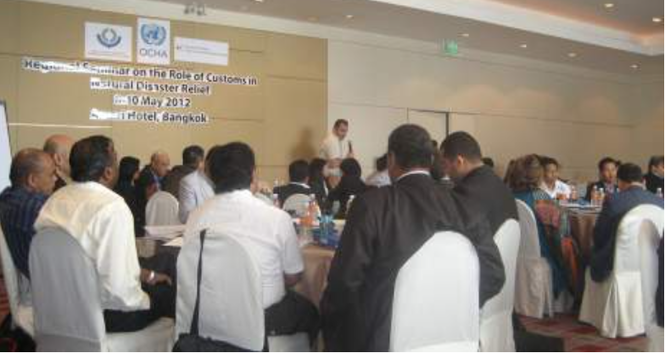
In May 2012, the World Customs Organization (WCO), the United Nations Office for the Coordination of Humanitarian Affairs (OCHA) and the International Federation of Red Cross and Red Crescent Societies (IFRC) held a joint regional seminar on the role of customs in natural disaster relief in the Asia Pacific region. This was the first in a series of regional seminars planned by the three organizations, as requested in the June 2011 resolution of the WCO’s Customs Co-operation Council.
Considering the increase in the number of natural disasters affecting populations and requiring urgent international humanitarian assistance, as well as the need to enhance the role of Customs in the management of humanitarian relief operations, the seminar strongly highlighted the need for natural disaster preparedness in Customs administrations so that they can respond efficiently and effectively to emergency situations.
Over ninety participants were brought together from WCO member states in the Asia Pacific region, including representatives from national customs administrations, national disaster management authorities, National Red Cross/Red Crescent (RCRC) societies, non-governmental organizations (NGOs) and United Nations (UN) agencies, among others.
In his opening remarks, Khun Sawanit Kongsiri, Assistant Secretary General from the Thai Red Cross Society, highlighted the timely nature of this seminar, in light of the increasing impacts of climate change and the subsequent frequency of natural disasters. He also emphasized the need for humanitarian actors like the Red Cross and Red Crescent to coordinate with customs authorities on these issues. Mr. Oliver Lacey-Hall, the Head of OCHA’s regional office for the Asia Pacific, also highlighted the efforts being made across the region to address and improve disaster response, including through the establishment of the Association of Southeast Asian Nations (ASEAN) Humanitarian Assistance Centre and the South Asian Association for Regional Cooperation (SAARC) Disaster Management Centre.
Over the course of the three-day seminar, the participants were introduced to the key customs and operational challenges for international responders, customs officials, and national disaster management authorities. They also assessed the international legal framework for disaster response, the key legal instruments, and the international coordination system for disaster relief. A variety of speakers from the WCO member states’ customs and disaster management authorities spoke about their national legislation and policies for customs procedures in disaster situations, and how to strengthen relationships and cooperation between customs authorities and assisting actors.
The seminar aimed to produce a set of key deliverables, including increasing awareness among governments of the need for national regulations in respect of international relief and assistance operations, and understanding what humanitarian organizations can do to facilitate customs administrations' efforts in the event of a disaster.
The participants worked together in country delegations and formulated elements of a plan of action to move forward on addressing the challenges identified over the course of the seminar. They prepared short-term, immediate steps, as well as long-term plans for the future, which they could share with government and National Society colleagues back home. One participant remarked that “the information presented during the workshop will provide the foundations needed to develop and improve our own systems for disaster response.”
By bringing together the relevant experts in this field within the Asia Pacific region, the seminar served as a forum for key exchanges, which will enable customs officials and their partners to gain a full grasp of the measures to be implemented in emergency situations.
Please click here for the full workshop report.